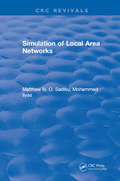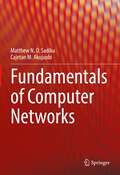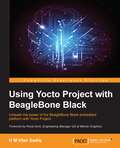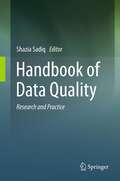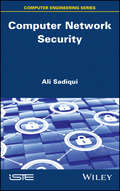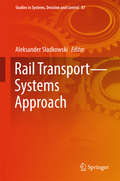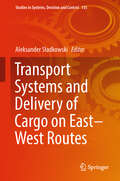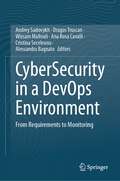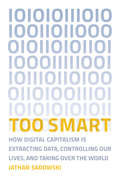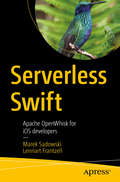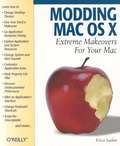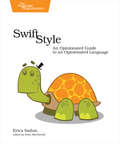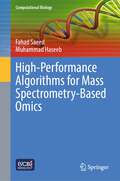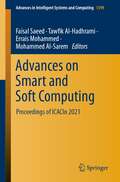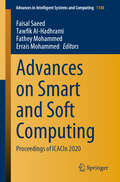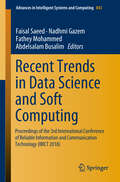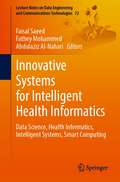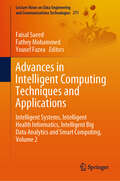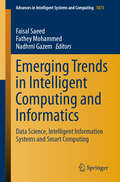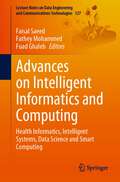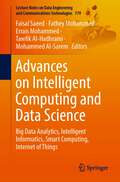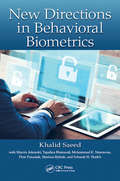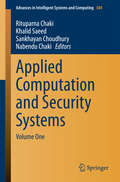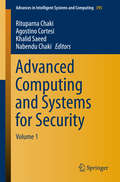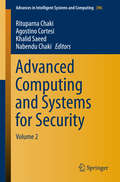- Table View
- List View
Simulation of Local Area Networks
by Matthew N. SadikuA fast-growing area in the communications industry is the internetworking of an ever-increasing proliferation of computers, particularly via local area networks (LANs). The LAN is a resource-sharing data communications network being used by many offices to interchange information such as electronic mail, word processing, and files among computers and other devices. This unique book shows the user how to establish the performance characteristics of a LAN before putting it to use in a particular type of situation. Simulation of Local Area Networks consists of eight chapters, each with its own extensive list of references. The first chapter provides a brief review of local area networks, and the second chapter gives the analytical models of popular LANs-token-passing bus and ring networks, CSMA/CD LANs, and star networks. Chapter 3 covers general principles of simulation, and Chapter 4 discusses fundamental concepts in probability and statistics relating to simulation modeling. Materials in Chapters 3 and 4 are specifically applied in developing simulation models on token-passing LANs, CSMA/CD LANs, and star LANs in Chapters 5 through 7. The computer code in Chapters 5, 6, and 7 is divided into segments, and a detailed explanation of each segment is provided. The last chapter reviews special-purpose languages such as GPSS, SIMSCRIPT, GASP, SIMULA, SLAM, and RESQ. Helpful criteria for language selection are included. The entire code is put together in the appendixes. This book has two major advantages over existing texts. First, it uses C, a well-developed general-purpose language that is familiar to most analysts. Second, the text specifically applies the simulation principles to local area networks. No other book available shows the systems analyst how to evaluate the performance of existing or proposed systems under different kinds of conditions.
Fundamentals of Computer Networks
by Matthew N. Sadiku Cajetan M. AkujuobiThis textbook presents computer networks to electrical and computer engineering students in a manner that is clearer, more interesting, and easier to understand than other texts. All principles are presented in a lucid, logical, step-by-step manner. As much as possible, the authors avoid wordiness and giving too much detail that could hide concepts and impede overall understanding of the material. Ten review questions in the form of multiple-choice objective items are provided at the end of each chapter with answers. The review questions are intended to cover the little “tricks” which the examples and end-of-chapter problems may not cover. They serve as a self-test device and help students determine how well they have mastered the chapter.
Using Yocto Project with BeagleBone Black
by H M SadiqThis book is ideal for system developers with knowledge and experience of embedded systems. Knowledge of BeagleBone Black is assumed, while no knowledge of Yocto Project build system is necessary.
Handbook of Data Quality: Research and Practice
by Shazia SadiqThe issue of data quality is as old as data itself. However, the proliferation of diverse, large-scale and often publically available data on the Web has increased the risk of poor data quality and misleading data interpretations. On the other hand, data is now exposed at a much more strategic level e.g. through business intelligence systems, increasing manifold the stakes involved for individuals, corporations as well as government agencies. There, the lack of knowledge about data accuracy, currency or completeness can have erroneous and even catastrophic results. With these changes, traditional approaches to data management in general, and data quality control specifically, are challenged. There is an evident need to incorporate data quality considerations into the whole data cycle, encompassing managerial/governance as well as technical aspects. Data quality experts from research and industry agree that a unified framework for data quality management should bring together organizational, architectural and computational approaches. Accordingly, Sadiq structured this handbook in four parts: Part I is on organizational solutions, i.e. the development of data quality objectives for the organization, and the development of strategies to establish roles, processes, policies, and standards required to manage and ensure data quality. Part II, on architectural solutions, covers the technology landscape required to deploy developed data quality management processes, standards and policies. Part III, on computational solutions, presents effective and efficient tools and techniques related to record linkage, lineage and provenance, data uncertainty, and advanced integrity constraints. Finally, Part IV is devoted to case studies of successful data quality initiatives that highlight the various aspects of data quality in action. The individual chapters present both an overview of the respective topic in terms of historical research and/or practice and state of the art, as well as specific techniques, methodologies and frameworks developed by the individual contributors. Researchers and students of computer science, information systems, or business management as well as data professionals and practitioners will benefit most from this handbook by not only focusing on the various sections relevant to their research area or particular practical work, but by also studying chapters that they may initially consider not to be directly relevant to them, as there they will learn about new perspectives and approaches.
Computer Network Security
by Ali SadiquiDeveloped in collaboration with a training and certification team from Cisco, Computer Network Security is an exploration of the state-of-the-art and good practices in setting up a secure computer system. Concrete examples are offered in each chapter, to help the reader to master the concept and apply the security configuration. This book is intended for students preparing for the CCNA Security Exam (210-260 IINS) ? whether at professional training centers, technical faculties, or training centers associated with the "Cisco Academy" program. It is also relevant to anyone interested in computer security, be they professionals in this field or users who want to identify the threats and vulnerabilities of a network to ensure better security.
Rail Transport—Systems Approach
by Aleksander SładkowskiThis book shows how the systems approach is employed by scientists in various countries to solve specific problems concerning railway transport. In particular, the book describes the experiences of scientists from Romania, Germany, the Czech Republic, the UK, Russia, Ukraine, Lithuania and Poland. For many of these countries there is a problem with the historical differences between the railways. In particular, there are railways with different rail gauges, with different signaling and communication systems, with different energy supplies and, finally, with different political systems, which are reflected in the different approaches to the management of railway economies. The book’s content is divided into two main parts, the first of which provides a systematic analysis of individual means of providing and maintaining rail transport. In turn, the second part addresses infrastructure and management development, with particular attention to security issues. Though primarily written for professionals involved in various problems concerning railway transport, the book will also benefit manufacturers, railway technical staff, managers, and students with transport specialties, as well as a wide range of readers interested in learning more about the current state of transport in different countries.
Transport Systems and Delivery of Cargo on East–West Routes (Studies In Systems, Decision And Control #155)
by Aleksander SładkowskiThis book discusses the problems of delivering goods from East and South-East Asia to Europe, presenting the regional transport problems experienced in Italy, Slovakia, Russia, Georgia, Kazakhstan, Uzbekistan and Poland. The book is divided into two parts. The first part is devoted to the analysis of various issues in global logistics and regional transport, which operate in transport corridors. The second part of the book focuses on solutions to some of the technical and informatics problems related to the organization of transportation along the East–West routes. Intended primarily for professionals involved in various aspects of cargo delivery along the East–West routes, the book is also useful for manufacturers, technical staff at logistics companies, managers, students of transport-related subjects, as well as for a wide range of readers interested in the current state of transport in different countries.
CyberSecurity in a DevOps Environment: From Requirements to Monitoring
by Andrey Sadovykh Dragos Truscan Wissam Mallouli Ana Rosa Cavalli Cristina Seceleanu Alessandra BagnatoThis book provides an overview of software security analysis in a DevOps cycle including requirements formalisation, verification and continuous monitoring. It presents an overview of the latest techniques and tools that help engineers and developers verify the security requirements of large-scale industrial systems and explains novel methods that enable a faster feedback loop for verifying security-related activities, which rely on techniques such as automated testing, model checking, static analysis, runtime monitoring, and formal methods. The book consists of three parts, each covering a different aspect of security engineering in the DevOps context. The first part, "Security Requirements", explains how to specify and analyse security issues in a formal way. The second part, "Prevention at Development Time", offers a practical and industrial perspective on how to design, develop and verify secure applications. The third part, "Protection at Operations", eventually introduces tools for continuous monitoring of security events and incidents. Overall, it covers several advanced topics related to security verification, such as optimizing security verification activities, automatically creating verifiable specifications from security requirements and vulnerabilities, and using these security specifications to verify security properties against design specifications and generate artifacts such as tests or monitors that can be used later in the DevOps process. The book aims at computer engineers in general and does not require specific knowledge. In particular, it is intended for software architects, developers, testers, security professionals, and tool providers, who want to define, build, test, and verify secure applications, Web services, and industrial systems.
Too Smart: How Digital Capitalism is Extracting Data, Controlling Our Lives, and Taking Over the World (The\mit Press Ser.)
by Jathan SadowskiWho benefits from smart technology? Whose interests are served when we trade our personal data for convenience and connectivity?Smart technology is everywhere: smart umbrellas that light up when rain is in the forecast; smart cars that relieve drivers of the drudgery of driving; smart toothbrushes that send your dental hygiene details to the cloud. Nothing is safe from smartification. In Too Smart, Jathan Sadowski looks at the proliferation of smart stuff in our lives and asks whether the tradeoff—exchanging our personal data for convenience and connectivity—is worth it. Who benefits from smart technology?Sadowski explains how data, once the purview of researchers and policy wonks, has become a form of capital. Smart technology, he argues, is driven by the dual imperatives of digital capitalism: extracting data from, and expanding control over, everything and everybody. He looks at three domains colonized by smart technologies' collection and control systems: the smart self, the smart home, and the smart city. The smart self involves more than self-tracking of steps walked and calories burned; it raises questions about what others do with our data and how they direct our behavior—whether or not we want them to. The smart home collects data about our habits that offer business a window into our domestic spaces. And the smart city, where these systems have space to grow, offers military-grade surveillance capabilities to local authorities. Technology gets smart from our data. We may enjoy the conveniences we get in return (the refrigerator says we're out of milk!), but, Sadowski argues, smart technology advances the interests of corporate technocratic power—and will continue to do so unless we demand oversight and ownership of our data.
Serverless Swift: Apache OpenWhisk for iOS developers
by Marek Sadowski Lennart FrantzellDecrease development time to market with Serverless Swift—the event-based modern architecture for full stack developers. This book reviews how to use the Apache OpenWhisk framework to enrich your standalone applications with cloud-based functionalities from data sources up to Artificial Intelligence. You'll leverage serverless in your mobile apps with use case scenarios and gain the skills that will allow you to create robust, performant, secure yet economically viable systems in a cloud native environment. Finally, you'll see how to participate in the creation and further development of this open source project with Apache Foundation, which is supported by IBM, Google, and othersServerless has become a new style of coding, and it can be used to offload your mobile apps without incurring unnecessary costs. Get a solid, hands-on introduction into serverless, function-as-a-service, and cloud function technologies and learn why startups and enterprises are so excited about using them. What You'll LearnEmploy Apache OpenWhisk in your appsExpand your iOS skills with Cloud Native Serverless programmingUse a Docker container as a Polyglot actionWho This Book Is ForDevelopers, development leaders in the enterprise, and startup CTOs who want to learn a leading technology for the cloud in order to enrich applications with SaaS, Social Networks, and cloud based AI and APIs.
Modding Mac OS X
by Erica SadunModding Mac OS X isn't about cutting up your Power Mac's case with a saws-all; it's about modifying Mac OS X's user interface and unlocking secrets and dispelling your fears of the Unix command line so you can take command of your Mac. Modding Mac OS X starts out with the very basics of showing you how to configure your Mac and do simple things like change Finder views, use an image from iPhoto's library on your desktop, and how to find and use screen savers. From there, Modding Mac OS X shows you how to: Find hidden features in your favorite applications Dive inside application bundles to find hidden resources Change application and system-wide keyboard shortcuts Work with the Property List Editor to read and edit property list files Wrap your head around the defaults command to tweak an application's settings Hack on NIB files to change an application's interface Control an application with AppleScript, even if it isn't scriptable Each Modding example includes detailed step-by-step instructions that even a novice Mac user can follow, while also providing the necessary detail to satisfy the experienced hacker. The knowledge you gain from tweaking one application can be easily applied to the next. So go on, empower your inner Mac geek. You know you want to.
Swift Style: An Opinionated Guide to an Opinionated Language
by Erica SadunDiscover the do's and don'ts involved in crafting readable Swift code as you explore common Swift coding challenges and the best practices that address them. From spacing, bracing, and semicolons to proper API style, discover the whys behind each recommendation, and add to or establish your own house style guidelines. This practical, powerful, and opinionated guide offers the best practices you need to know to work successfully in this equally opinionated programming language. Apple's Swift programming language has finally reached stability, and developers are demanding to know how to program the language properly. Swift Style guides you through the ins and outs of Swift programming best practices. This is the first best practices book for serious, professional Swift programmers and for programmers who want to shine their skills to be hired in this demanding market. A style guide offers a consistent experience of well-crafted code that lets you focus on the code's underlying meaning, intent, and implementation. This book doesn't offer canonical answers on Swift coding style. It explores the areas of Swift where structure comes into play. Whether you're developing a personal style or a house style, there are always ways to enhance your code choices. You'll find here the ideas and principles to establish or enhance your own best style practices. Begin with simple syntactical styling. Strengthen code bracing for easy readability. Style your closures for safety and resilience. Perfect spacing and layout. Master literal initialization and typing. Optimize control flow layout and improve conditional style choices. Transition from Objective-C and move code into Swift the right way. Boost API design using proper naming and labeling. Elevate defaulted arguments and variadics to their right places. Finally, Erica offers her own broad recommendations on good coding practice. What You Need: Recent version of the Swift programming language
High-Performance Algorithms for Mass Spectrometry-Based Omics (Computational Biology)
by Fahad Saeed Muhammad HaseebTo date, processing of high-throughput Mass Spectrometry (MS) data is accomplished using serial algorithms. Developing new methods to process MS data is an active area of research but there is no single strategy that focuses on scalability of MS based methods. Mass spectrometry is a diverse and versatile technology for high-throughput functional characterization of proteins, small molecules and metabolites in complex biological mixtures. In the recent years the technology has rapidly evolved and is now capable of generating increasingly large (multiple tera-bytes per experiment) and complex (multiple species/microbiome/high-dimensional) data sets. This rapid advance in MS instrumentation must be matched by equally fast and rapid evolution of scalable methods developed for analysis of these complex data sets. Ideally, the new methods should leverage the rich heterogeneous computational resources available in a ubiquitous fashion in the form of multicore, manycore, CPU-GPU, CPU-FPGA, and IntelPhi architectures. The absence of these high-performance computing algorithms now hinders scientific advancements for mass spectrometry research. In this book we illustrate the need for high-performance computing algorithms for MS based proteomics, and proteogenomics and showcase our progress in developing these high-performance algorithms.
Advances on Smart and Soft Computing: Proceedings of ICACIn 2021 (Advances in Intelligent Systems and Computing #1399)
by Faisal Saeed Tawfik Al-Hadhrami Errais Mohammed Mohammed Al-SaremThis book presents the papers included in the proceedings of the 2nd International Conference of Advanced Computing and Informatics (ICACIn’21) that was held in Casablanca, Morocco, on May 24–25, 2021. The main theme of the book is “Advances on Smart and Soft Computing.” A total of 71 papers were submitted to the conference, but only 44 papers were accepted and published in this book. The book presents several hot research topics which include artificial intelligence and data science, big data analytics, Internet of Things (IoT), information security, cloud computing, networking and computational informatics.
Advances on Smart and Soft Computing: Proceedings of ICACIn 2020 (Advances in Intelligent Systems and Computing #1188)
by Faisal Saeed Tawfik Al-Hadhrami Fathey Mohammed Errais MohammedThis book gathers high-quality papers presented at the First International Conference of Advanced Computing and Informatics (ICACIn 2020), held in Casablanca, Morocco, on April 12–13, 2020. It covers a range of topics, including artificial intelligence technologies and applications, big data analytics, smart computing, smart cities, Internet of things (IoT), data communication, cloud computing, machine learning algorithms, data stream management and analytics, deep learning, data mining applications, information retrieval, cloud computing platforms, parallel processing, natural language processing, predictive analytics, knowledge management approaches, information security, security in IoT, big data and cloud computing, high-performance computing and computational informatics.
Recent Trends in Data Science and Soft Computing: Proceedings of the 3rd International Conference of Reliable Information and Communication Technology (IRICT 2018) (Advances in Intelligent Systems and Computing #843)
by Faisal Saeed Nadhmi Gazem Fathey Mohammed Abdelsalam BusalimThis book presents the proceedings of the 3rd International Conference of Reliable Information and Communication Technology 2018 (IRICT 2018), which was held in Kuala Lumpur, Malaysia, on July 23–24, 2018. The main theme of the conference was “Data Science, AI and IoT Trends for the Fourth Industrial Revolution.” A total of 158 papers were submitted to the conference, of which 103 were accepted and considered for publication in this book. Several hot research topics are covered, including Advances in Data Science and Big Data Analytics, Artificial Intelligence and Soft Computing, Business Intelligence, Internet of Things (IoT) Technologies and Applications, Intelligent Communication Systems, Advances in Computer Vision, Health Informatics, Reliable Cloud Computing Environments, Recent Trends in Knowledge Management, Security Issues in the Cyber World, and Advances in Information Systems Research, Theories and Methods.
Innovative Systems for Intelligent Health Informatics: Data Science, Health Informatics, Intelligent Systems, Smart Computing (Lecture Notes on Data Engineering and Communications Technologies #72)
by Faisal Saeed Fathey Mohammed Abdulaziz Al-NahariThis book presents the papers included in the proceedings of the 5th International Conference of Reliable Information and Communication Technology 2020 (IRICT 2020) that was held virtually on December 21–22, 2020. The main theme of the book is “Innovative Systems for Intelligent Health Informatics”. A total of 140 papers were submitted to the conference, but only 111 papers were published in this book. The book presents several hot research topics which include health informatics, bioinformatics, information retrieval, artificial intelligence, soft computing, data science, big data analytics, Internet of things (IoT), intelligent communication systems, information security, information systems, and software engineering.
Advances in Intelligent Computing Techniques and Applications: Intelligent Systems, Intelligent Health Informatics, Intelligent Big Data Analytics and Smart Computing, Volume 2 (Lecture Notes on Data Engineering and Communications Technologies #211)
by Faisal Saeed Fathey Mohammed Yousef FazeaThis book presents the papers included in the proceedings of the 7th International Conference of Reliable Information and Communication Technology 2023 (IRICT 2023) that was held in Pulai Springs Resorts, Johor, Malaysia on 27-28, December 2023. IRICT 2023 is organized by the Yemeni Scientists Research Group (YSRG) and Big Data Center in Universiti Teknologi Malaysia (Malaysia) in collaboration with Association for Information Systems – Malaysia Chapter (MyAIS) and College of Engineering, IT and Environment at Charles Darwin University (Australia). IRICT2023 is a forum for the presentation of technological advances in the field of Information and Communication Technology. The main theme of the conference is “Advances in Intelligent Computing Techniques and Applications”. The book discusses several research topics such as Health Informatics, Artificial Intelligence, Soft Computing, Data Science, Big Data Analytics, Internet of Things (IoT), Intelligent Communication Systems, Cyber Security, and Information System. These papers were presented in three parallel sessions during the two days.
Emerging Trends in Intelligent Computing and Informatics: Data Science, Intelligent Information Systems and Smart Computing (Advances in Intelligent Systems and Computing #1073)
by Faisal Saeed Fathey Mohammed Nadhmi GazemThis book presents the proceedings of the 4th International Conference of Reliable Information and Communication Technology 2019 (IRICT 2019), which was held in Pulai Springs Resort, Johor, Malaysia, on September 22–23, 2019. Featuring 109 papers, the book covers hot topics such as artificial intelligence and soft computing, data science and big data analytics, internet of things (IoT), intelligent communication systems, advances in information security, advances in information systems and software engineering.
Advances on Intelligent Informatics and Computing: Health Informatics, Intelligent Systems, Data Science and Smart Computing (Lecture Notes on Data Engineering and Communications Technologies #127)
by Faisal Saeed Fathey Mohammed Fuad GhalebThis book presents emerging trends in intelligent computing and informatics. This book presents the papers included in the proceedings of the 6th International Conference of Reliable Information and Communication Technology 2021 (IRICT 2021) that was held virtually, on Dec. 22-23, 2021. The main theme of the book is “Advances on Intelligent Informatics and Computing”. A total of 87 papers were submitted to the conference, but only 66 papers were accepted and published in this book. The book presents several hot research topics which include health informatics, artificial intelligence, soft computing, data science, big data analytics, Internet of Things (IoT), intelligent communication systems, cybersecurity, and information systems.
Advances on Intelligent Computing and Data Science: Big Data Analytics, Intelligent Informatics, Smart Computing, Internet of Things (Lecture Notes on Data Engineering and Communications Technologies #179)
by Faisal Saeed Fathey Mohammed Errais Mohammed Tawfik Al-Hadhrami Mohammed Al-SaremThis book presents the papers included in the proceedings of the 3rd International Conference of Advanced Computing and Informatics (ICACin’22) that was held in Casablanca, Morocco, on October 15–16, 2022. A total of 98 papers were submitted to the conference, but only 60 papers were accepted and published in this book with an acceptance rate of 61%. The book presents several hot research topics which include artificial intelligence and data science, big data analytics, Internet of Things (IoT) and smart cities, information security, cloud computing and networking, and computational informatics.
New Directions in Behavioral Biometrics
by Khalid SaeedAutomatic biometrics recognition techniques are increasingly important in corporate and public security systems and have increased in methods due to rapid field development. This book discusses classic behavioral biometrics as well as collects the latest advances in techniques, theoretical approaches, and dynamic applications. This future-looking book is an important reference tool for researchers, practitioners, academicians, and technologists. While there are existing books that focus on physiological biometrics or algorithmic approaches deployed in biometrics, this book addresses a gap in the existing literature for a text that is solely dedicated to the topic of behavioral biometrics.
Applied Computation and Security Systems: Volume One (Advances in Intelligent Systems and Computing #304)
by Khalid Saeed Nabendu Chaki Rituparna Chaki Sankhayan ChoudhuryThis book contains the extended version of the works that have been presented and discussed in the First International Doctoral Symposium on Applied Computation and Security Systems (ACSS 2014) held during April 18-20, 2014 in Kolkata, India. The symposium has been jointly organized by the AGH University of Science & Technology, Cracow, Poland and University of Calcutta, India. The Volume I of this double-volume book contains fourteen high quality book chapters in three different parts. Part 1 is on Pattern Recognition and it presents four chapters. Part 2 is on Imaging and Healthcare Applications contains four more book chapters. The Part 3 of this volume is on Wireless Sensor Networking and it includes as many as six chapters. Volume II of the book has three Parts presenting a total of eleven chapters in it. Part 4 consists of five excellent chapters on Software Engineering ranging from cloud service design to transactional memory. Part 5 in Volume II is on Cryptography with two book chapters in it. Part 6 of this volume is on Computer Aided Design with four chapters in it. We strongly believe that the twenty five chapters in these two volumes of Applied Computation and Security Systems will be appreciated by all its readers.
Advanced Computing and Systems for Security: Volume 1 (Advances in Intelligent Systems and Computing #395)
by Khalid Saeed Nabendu Chaki Agostino Cortesi Rituparna ChakiThe book contains the extended version of the works that have been presented and discussed in the Second International Doctoral Symposium on Applied Computation and Security Systems (ACSS 2015) held during May 23-25, 2015 in Kolkata, India. The symposium has been jointly organized by the AGH University of Science & Technology, Cracow, Poland; Ca' Foscari University, Venice, Italy and University of Calcutta, India. The book is divided into volumes and presents dissertation works in the areas of Image Processing, Biometrics-based Authentication, Soft Computing, Data Mining, Next Generation Networking and Network Security, Remote Healthcare, Communications, Embedded Systems, Software Engineering and Service Engineering.
Advanced Computing and Systems for Security: Volume 2 (Advances in Intelligent Systems and Computing #396)
by Khalid Saeed Nabendu Chaki Agostino Cortesi Rituparna ChakiThe book contains the extended version of the works that have been presented and discussed in the Second International Doctoral Symposium on Applied Computation and Security Systems (ACSS 2015) held during May 23-25, 2015 in Kolkata, India. The symposium has been jointly organized by the AGH University of Science & Technology, Cracow, Poland; Ca' Foscari University, Venice, Italy and University of Calcutta, India. The book is divided into volumes and presents dissertation works in the areas of Image Processing, Biometrics-based Authentication, Soft Computing, Data Mining, Next Generation Networking and Network Security, Remote Healthcare, Communications, Embedded Systems, Software Engineering and Service Engineering.
